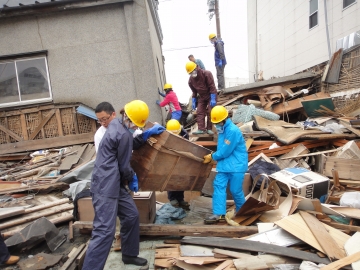Research Theme
Using the three keywords of declining birthrate and aging population, digitalization, and globalization, we analyze changes in the relationship between sports, individuals, and society from the perspectives of sociology, sports and health sciences, and policy studies. Based on the results, we proposethe role and potential of sports for a sustainable future.
Research Director
TAKAHASHI, Yoshio
Faculty of Sport Sciences, School of Sport and Sciences
Project Members
- MATSUOKA, Hirotaka Professor, Faculty of Sport Sciences, School of Sport and Sciences
- NAKAMURA, Yoshio Professor, Faculty of Sport Sciences, School of Sport and Sciences
- SATO, Shintaro Professor, Faculty of Sport Sciences, School of Sport and Sciences
- TAKAHASHI, Yoshio Professor, Faculty of Sport Sciences, School of Sport and Sciences
- ARAI, Hiroyuki Guest Senior Researcher(Guest Professor), Comprehensive Research Organization
- ISHIHARA, Yasushi
- KAMBARA, Akitomo
- KODA, Hiroaki
- SAITO, Masayuki
- SEKIGUCHI, Keita
- TAMARU, Naotoshi
Research Keywords
Sports, future, environment, digital, aging society, declining birthrate, global
Research Summary
The decline in our nation’s population and the aging society pose a risk of shrinking the regional economy, accelerating the vicious cycle of further population decline and a declining birthrate alongside an aging population. In
particular, depopulated areas face challenges in maintaining communities, making life in rural regions increasingly difficult. In such areas, issues such as loneliness, isolation, and frailty among the elderly have become serious concerns.
Meanwhile, sports are expected to play a role as a tool for addressing issues related to Environment, Social, and Governance (ESG). The research institute is launching a study to clarify the role and potential of new forms of sports utilizing rapidly advancing IT technologies. Virtual sports that incorporate IT technology have already been linked to brain activity stimulation, and games that involve physical movement may provide opportunities for elderly individuals to engage in physical activities. In Japan, efforts to explore the potential of sports in virtual spaces are expanding, as evidenced by the establishment of the “Virtual Sports and Town Development Research Group” by
the Japan Sports Agency in 2024, chaired by Yoshio Takahashi. This research group has pointed out that virtual sports and e-sports may contribute to regional revitalization by attracting visitors from outside the area through events, increasing interaction among populations.
On the international stage, e-sports will become an official event at the Aichi-Nagoya Asian Games in 2026, and the International Olympic Committee plans to host the IOC eSports Games in 2027. This demonstrates the growing global interest in leveraging virtual sports and e-sports to build a better society. Moreover, virtual sports and e-sports, powered by digital technologies, enable sports and physical activities to be conducted across different venues, with internet-connected devices facilitating interactions beyond physical space.
Against this backdrop, Waseda University has established the Institute for Future Sports Studies to explore how sports can contribute to health and community formation, taking into account Japan’s future demographic trends. As part of its research efforts, the institute will investigate the potential of virtual sports and e-sports by hosting events in regions experiencing significant population decline, encouraging elderly participation, and studying their physical and social changes. Additionally, the institute will explore ways to utilize virtual sports and e-sports in aging and depopulated areas, including disaster-stricken communities. Specifically, it will assess whether displaced residents can maintain connections with their hometowns through virtual sports and e-sports. These initiatives propose a form of disaster area support through non-material means, and their outcomes are expected to contribute to community building in depopulated regions.
Furthermore, research originating from virtual sports and e-sports may expand its scope to address elderly issues such as loneliness, isolation, and frailty, evolving into studies on “e-health.” Based on the findings of this research project, the institute will also undertake long-term investigations into topics such as the relationship between nutrition and sports, the effects of sports on disease prevention and rehabilitation, and its impact on mental health. Additionally, the institute will explore the formation of regional communities by incorporating perspectives beyond sports. By studying the role and potential of sports for a sustainable future, the institute aims to foster innovation in both sports and society, ultimately striving to build a better future.





















